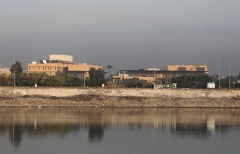
The U.S. Embassy compound in Baghdad’s Green Zone. (Photo by Ahmad al-Rubaye/AFP via Getty Images)
(CNSNews.com) – The Iraqi government says it’s taking steps to enhance security in Baghdad’s “Green Zone” and the city’s international airport following a U.S. warning that it could close its embassy there because of rocket attacks by Iran-sponsored Shi’ite militia, but a fresh rocket attack 200 miles north of the capital has raised the temperature further.
Six projectiles fired from a pickup truck and aimed at the international airport in Irbil caused no injuries or damage, according to the Kurdish regional government, which pointed the finger at the so-called Popular Mobilization Forces (PMF), a mostly-Shi’ite coalition dominated by Iranian Qods Force-backed militias. It was the first such attack in the Kurdistan region for months.
U.S. forces are based at the Irbil airport, part of a contingent deployed in Iraq to help train local forces to prevent a resurgence of the Sunni terrorist group ISIS in the country. U.S.-led coalition spokesman, Colonel Wayne Marotto, confirmed on Twitter that there were no casualties or damage, and said the incident was under investigation.
Over the past year, dozens of rocket attacks have targeted the U.S. Embassy or Iraqi military bases housing U.S. troops. In one such attack in March, two American troops and a British soldier were killed and 14 others wounded when Katyusha rockets hit Camp Taji, north of Baghdad. Another Katyusha attack, on a base near Kirkuk last December, cost the life of an American contractor.
In both of those deadly attacks, like the one in Irbil on Wednesday night, the perpetrators evidently fired the rockets from the back of pickup trucks. The earlier ones were blamed on Kata’ib Hezbollah, a Qods Force-backed militia in the PMF with a long history of attacks against U.S. forces in Iraq.
In addition to rocket attacks, an uptick of roadside bombs (IEDs) targeting coalition military convoys has also been recorded in recent months.
On Monday, Katyusha rockets thought to be targeting Baghdad airport – where U.S. troops are also based – instead hit a house nearby, killing two women and three children from the same family.
In phone conversations last week with Iraqi Prime Minister Mustafa al-Kadhimi and President Barham Salih, Secretary of State Mike Pompeo reportedly threatened to close the embassy, located in the Green Zone like many other foreign missions, unless the government reins in attacks attributed to the Shi’ite militia.
On Wednesday, Iraqi Foreign Minister Fuad Hussein said at a press conference the government hoped the U.S. not shut the embassy, expressing concern that if it did, other countries may follow suit. Closure of the U.S. Embassy would also signal to militia groups that their violent campaign has been successful, he said.
Hussein said the government was taking steps to step up security at the Baghdad airport and in the Green Zone.
Also on Wednesday, diplomats from the U.S. Embassy and two dozen other nations’ diplomatic missions met with Kadhimi, and in a joint statement afterwards “expressed our deep concern at the rise in the number and sophistication of attacks against diplomatic premises in Iraq, including rocket and IED attacks.”
“We noted that these attacks endanger not only foreign embassies but also Iraqis,” the statement continued, citing the fatal attack near the airport on Monday.
The diplomats voiced support for Iraq’s stability and sovereignty, said they welcomed measures being taken by the government to improve security at the airport and in the Green Zone and encouraged more to be put in place, and expressed a “willingness to help Iraq in addressing these security challenges.”
The statement said nothing about the possibility of the U.S. shuttering its embassy.
Kadhimi’s office said the prime minister during the meeting had “affirmed Iraq’s keenness to impose the rule of law, to ensure that only the state bears arms, and to protect diplomatic missions, stressing that those carrying out the attacks seek to destabilize Iraq and sabotage its regional and international relations.”
On Thursday, Kadhimi convened an emergency national security ministerial council meeting to discuss the security concerns, including the rocket attack in Irbil.
The presence of U.S. troops in Iraq is firmly opposed in some quarters. After last January’s U.S. drone strike that killed Qods Force commander Qassem Soleimani in Baghdad, Iraqi lawmakers voted to recommend that the government ask all foreign forces to leave the country. (Kadhimi took office in May, months after a long series of protests had brought down the previous government.)
U.S. Central Command commander Marine Gen. Kenneth McKenzie announced last month that U.S. troop numbers in Iraq would be reduced from about 5,200 to 3,000 by the end of September.




